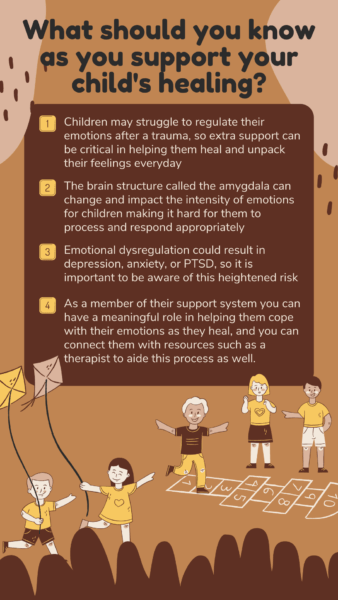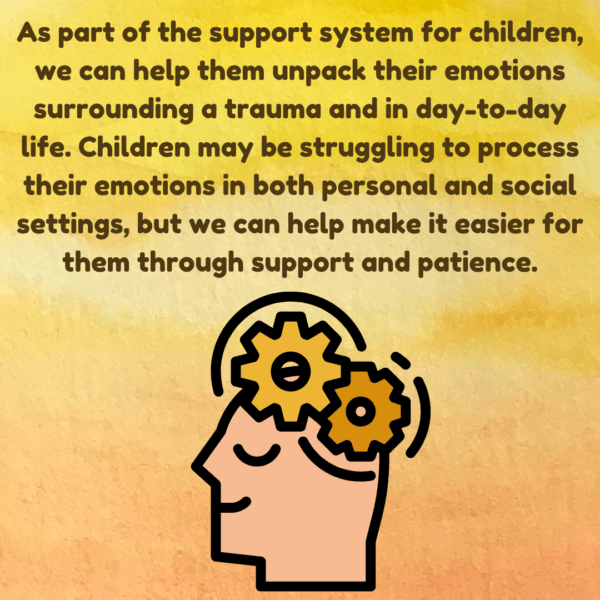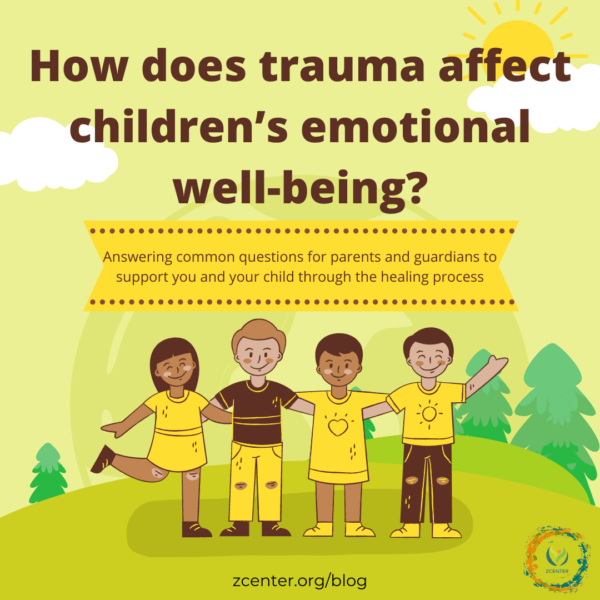 When children go through a traumatic event such as a sexual assault (SA), they must have a support system of parents and guardians there to ensure not only their physical safety but also their mental and emotional safety in the aftermath. It is not a surprise that children who experience trauma will have their world changed, but fortunately, there are things we can do to support them through this time and those changes. Trauma can occur across a variety of situations from being impacted by broad natural disasters all the way down to more personal and specific events such as SA. Trauma is a complex concept because every individual adapts and reacts differently from non-existent or acute reactions all the way to severe and chronic reactions; so viewing trauma as a sliding scale is essential in adjusting to a new normal after a traumatic event. Further, it is worth noting that two individuals can experience the same type of event or even the exact same event and still be impacted very differently, therefore different supports and approaches in healing are necessary.
When children go through a traumatic event such as a sexual assault (SA), they must have a support system of parents and guardians there to ensure not only their physical safety but also their mental and emotional safety in the aftermath. It is not a surprise that children who experience trauma will have their world changed, but fortunately, there are things we can do to support them through this time and those changes. Trauma can occur across a variety of situations from being impacted by broad natural disasters all the way down to more personal and specific events such as SA. Trauma is a complex concept because every individual adapts and reacts differently from non-existent or acute reactions all the way to severe and chronic reactions; so viewing trauma as a sliding scale is essential in adjusting to a new normal after a traumatic event. Further, it is worth noting that two individuals can experience the same type of event or even the exact same event and still be impacted very differently, therefore different supports and approaches in healing are necessary.
Now, to unpack how emotions in the brain are impacted by a trauma, this blog post indicates that SA is a traumatic event, and so in the aftermath of a trauma any of the upcoming information can occur. Trauma can specifically impact emotions for children by changing their ability to process and respond to emotions- which is called “emotional regulation.” All children are unique in how they experience the world, but understandably, when trauma occurs there is an added layer of difficulty for their growing brains to comprehend the world around them. The goal of this blog post is to give parents, guardians, and caretakers insight into the psychology of childhood emotional regulation and how they can support their child or any child through one of the most difficult things someone can experience. Below are some common questions one might ask in the aftermath of a trauma and when they are preparing to help a child heal. Accompanying each provided question is a response supported by trauma-informed scientific evidence that reveals what you can do to support your child through changes and challenges.
What happens to my child’s emotions when they experience a trauma?
A certain part of the brain called the amygdala can be impacted for those who experience trauma. The amygdala is responsible for emotional intensity including how we perceive and react emotionally. This can mean that children who undergo trauma have a greater experience of emotion compared to their peers, and that may be a lot for their body to handle since their brain hasn’t finished developing or understanding emotions yet. Further, scientists have studied the brain and the amygdala to reveal that there can be a decrease in brain activity in the amygdala which in turn can impact emotional regulation (Thomason et al., 2015). What this means is that structurally there will be some changes in the brain for your child after a trauma; so, as parents and guardians taking the time to work through emotions manually with a child can be very beneficial for the child to lighten the load of the emotional material they are working to process, since it can be too overwhelming to handle themselves. Of course, it is always important to recognize that not all children will feel comfortable expressing their emotions in a timeline you might expect, so as someone supporting them, we need to respect and understand their boundaries and decisions while continuing to make sure they have access to support.
How do I know if my child is struggling with healthy emotional regulation?
Children process emotions around the trauma and in day-to-day life as the event can impact pre-existing healthy emotional regulation because the child may soon experience emotional dysregulation which would not be considered healthy. To see if your child is struggling, there are certain signs that you can look for to indicate if dysregulation is happening. A child may experience prolonged states of sadness, they may lose interest in activities they typically love, or they may withdraw from peers or family in a social setting. These examples can all reflect symptoms of depression, indicating that healthy emotional regulation is not happening. Depression can specifically stem from struggling to “reappraise emotions” meaning that it impacts our ability to understand something from a different or more positive perspective (Skymba et al., 2020). Children especially can struggle in coping with negative emotions regardless of experiencing trauma because they tend to “ruminate” or replay their thoughts and emotions in their minds which further intensifies their feelings. We can support an individual through this by seeing a licensed therapist that can help them unpack these thoughts/emotions and give them the space to positively reappraise emotions, which in turn can decrease depression and set the child up to practice healthier emotional reappraisal and regulation techniques.
What are other ways trauma can affect a child?
It is not uncommon for other health issues to occur aside from depression, so it is important to be in tune with what may be going on in your child’s head and what you can look for to help them. Aside from ensuring that the child is physically safe after a trauma, we need to make sure they are mentally safe as well. There is evidence of not only depression but also anxiety and post-traumatic stress disorder (PTSD) occurring in individuals who experience trauma (Ford et al., 2018). While this is no guarantee that your child will or will not experience these types of mental health struggles at any point following trauma, parents and guardians need to be aware that these things can and do happen. It is also important to understand that not everyone reacts to trauma the same way, and so the ways we support someone and the emotions they experience need to be adjusted to meet them where they are at and not where you want them to be. You can expect some changes in your child before and after experiencing a trauma, but you should closely monitor for instances of great emotional intensity, instances of muted emotional intensity, or instances that demonstrate incoherent emotions and be able to respond accordingly in those situations.
Furthermore, because trauma can impact the way children process and respond to emotions since their brains are doing more processing than normal in the wake of a trauma, a child could potentially experience impact to both existing and developing friendships. Because a child can experience hardship in understanding and processing the emotions of others, play can be difficult because the interactions may be frustrating or confusing in the aftermath of trauma. Friendships are an important support system for children and for younger children play is very positive for growth and development, so as a caretaker it is important to support your child through these now potentially difficult experiences by providing them resources and support.
Are these effects long-term?
As mentioned above, certain brain structures and certain emotional processes are impacted by trauma. However, these impacts are typically not a forever-state and rather will result in a delayed development instead before resuming processes as they were before a trauma. When a child (or anyone for that matter) has experienced a trauma, their body and brain are working overtime to maintain “normalcy” and make sure they are okay. Because time and energy may be devoted so long to other areas, there is a trend of delayed development for children specifically in the processes that allow them to understand the emotions of others during their emotional regulation. Limited research exists to assess how the brain functions before and after trauma since trauma is unpredictable, but the general agreement amongst psychologists is that wherever the current emotional developments are they will pause in response to trauma. This is not meant to be alarming, but rather to let us know that a child is going to need extra support and understanding when dealing with not only their own emotions but when interacting with the emotions of others as well (Van Schie, 2017). Further, it is important to know that specifically, reappraisal does not develop linearly through childhood and adolescence, but rather it is a workable skill (even for adults!), so having a delayed development is not detrimental so long as we continue to work with and support children in building this skill (McRae et al., 2012).
What can I do?
 It is important to know that as a parent or guardian, you are very important for helping a child heal, but it is also important to know that support systems look different for each individual. One important thing in healing from trauma is knowing that there is no “right way” to do things, rather finding your own way is the best option and making sure that you meet your child at their level of needs. Support can take the form of group therapy, individual therapy, having a family support system, attending family therapy, partaking in art or play therapy, and so forth to make sure an individual has the necessary resources to heal. There is evidence that being in these types of therapy settings and focusing on positive emotions in those such environments rather than ruminating or focusing on the past can decrease symptoms of depression in children in the aftermath of the trauma (Thomas et al., 2011). Further, parents should choose not to focus on the stress of the situation, but rather on the wellbeing of their child; it creates an environment that allows for positive emotions to flourish later in life for the child which is important for the healing process as it does not provide an environment for rumination to occur (Langevin et al., 2016). Parents can practice mindfulness in approaching this situation and play a part in decreasing the negative thoughts a child replays in their mind, since you are modeling healthy emotional behavior as well by doing so. Because parenting styles can easily be changed to adapt to our children, we must take the steps to support the child and adapt to their needs as they grow (Moreira et al., 2018). Mindfulness is another topic on its own, but for some parents/guardians it may be worth looking into as a way to personally cope and process while supporting a child through a trauma.
It is important to know that as a parent or guardian, you are very important for helping a child heal, but it is also important to know that support systems look different for each individual. One important thing in healing from trauma is knowing that there is no “right way” to do things, rather finding your own way is the best option and making sure that you meet your child at their level of needs. Support can take the form of group therapy, individual therapy, having a family support system, attending family therapy, partaking in art or play therapy, and so forth to make sure an individual has the necessary resources to heal. There is evidence that being in these types of therapy settings and focusing on positive emotions in those such environments rather than ruminating or focusing on the past can decrease symptoms of depression in children in the aftermath of the trauma (Thomas et al., 2011). Further, parents should choose not to focus on the stress of the situation, but rather on the wellbeing of their child; it creates an environment that allows for positive emotions to flourish later in life for the child which is important for the healing process as it does not provide an environment for rumination to occur (Langevin et al., 2016). Parents can practice mindfulness in approaching this situation and play a part in decreasing the negative thoughts a child replays in their mind, since you are modeling healthy emotional behavior as well by doing so. Because parenting styles can easily be changed to adapt to our children, we must take the steps to support the child and adapt to their needs as they grow (Moreira et al., 2018). Mindfulness is another topic on its own, but for some parents/guardians it may be worth looking into as a way to personally cope and process while supporting a child through a trauma.
What happens now?
Ultimately, all of this information demonstrates that trauma such as SA can impact a child, but as a parent, by taking part in their social support system we can help the child in better understanding their emotions and coping not only day-to-day but long-term as well. It is important to understand that having this information is a good step in moving forward and supporting children every day through one of the most challenging things someone can go through by having these questions answered, but we cannot forget that recovery is a process and not a destination. The Zacharias Center offers free counseling services that can be done in group therapy or individual therapy format to support that process. The phone number to reach the Z Center 24-hour support line is (847)872-7799, and this line is available to support survivors as well as their loved ones who are experiencing the trauma with them. As humans we really are resilient, and so recovery and healing will continue to be the desired outcome for those impacted by a trauma because through work it is attainable. Providing resources, reducing rumination and worrying, giving support to build coping and reappraisal skills, and ensuring that individuals have the specific mental tools to cope are all wonderful ways to foster resilience. The assistance of professionals or therapists who can help a child to discover those tools and resources also provide wonderful support options and pathways to help a child heal in the aftermath of a trauma.
Written by Haley Wold, ZCenter Volunteer from Lake Forest College.
ZCenter aims to end sexual violence, mobilize and educate the public, and support survivors of sexual assault. Our blog addresses issues related to ending oppression and violence, since all oppression and violence are intersectional with sexual violence. All ZCenter blog posts are written by state certified staff, interns, and volunteers. For questions on authorship or content, please email kjones@zcenter.org.
References
Ford, Brett Q., Sandy J. Lwi, Amy L. Gentzler, Benjamin Hankin, and Iris B. Mauss. 2018. “The Cost of Believing Emotions Are Uncontrollable: Youths’ Beliefs about Emotion Predict Emotion Regulation and Depressive Symptoms.” Journal of Experimental Psychology: General 147 (8): 1170–90. doi:10.1037/xge0000396.supp (Supplemental).
Langevin, Rachel, Martine Hébert, Dansereau, Claire Allard, and Bonnin, Anne‐Claude Bernard. 2016. “Emotion Regulation in Sexually Abused Preschoolers: The Contribution of Parental Factors.” Journal of Traumatic Stress 29 (2): 180–84. doi:10.1002/jts.22082.
McRae, Kateri, James J. Gross, Jochen Weber, Elaine R. Robertson, Peter Sokol-Hessner, Rebecca D. Ray, John D. E. Gabrieli, and Kevin N. Ochsner. 2012. “The Development of Emotion Regulation: An FMRI Study of Cognitive Reappraisal in Children, Adolescents and Young Adults.” Social Cognitive and Affective Neuroscience 7 (1): 11–22. doi:10.1093/scan/nsr093.
Moreira, Helena, and Maria Cristina Canavarro. 2018. “The Association between Self-Critical Rumination and Parenting Stress: The Mediating Role of Mindful Parenting.” Journal of Child and Family Studies 27 (7): 2265–75. doi:10.1007/s10826-018-1072-x.
Skymba, Haley V., Wendy Troop-Gordon, Haina H. Modi, Megan M. Davis, Anne L. Weldon, Yan Xia, Wendy Heller, and Karen D. Rudolph. 2020. “Emotion Mindsets and Depressive Symptoms in Adolescence: The Role of Emotion Regulation Competence.” Emotion, December. doi:10.1037/emo0000902.
Thomas, Renu, David DiLillo, Kate Walsh, and Melissa A. Polusny. 2011. “Pathways from Child Sexual Abuse to Adult Depression: The Role of Parental Socialization of Emotions and Alexithymia.” Psychology of Violence 1 (2): 121–35. doi:10.1037/a0022469.
Thomason, Moriah E., Hilary A. Marusak, Maria A. Tocco, Angela M. Vila, Olivia McGarragle, and David R. Rosenberg. 2015. “Altered Amygdala Connectivity in Urban Youth Exposed to Trauma.” Social Cognitive and Affective Neuroscience 10 (11): 1460–68. doi:10.1093/scan/nsv030.
Van Schie, Charlotte C., Anne-Laura van Harmelen, Kirsten Hauber, Albert Boon, Eveline A. Crone, and Bernet M. Elzinga. 2017. “The Neural Correlates of Childhood Maltreatment and the Ability to Understand Mental States of Others.” European Journal of Psychotraumatology 8 (1). doi:10.1080/20008198.2016.1272788.

